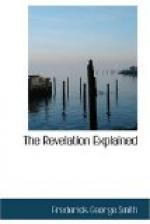The dread of Napoleon settled down upon all the nations of Europe. They could not cope with his mighty genius, and therefore his presence was a terror to them. When the allied powers secured his first abdication, in 1814, and sent him to the island of Elba, the desolating results of his long career were shown in the work that the Congress of Vienna was called upon to perform when it assembled in the fall of 1814. While the representatives of the powers were laboring to repair the damage that had been wrought and to adjust the territorial limitations of the various nations that had been altered or entirely demolished, the assemblage was suddenly surprised the following spring by the news that Napoleon had escaped from Elba and was enroute to Paris. The terror and consternation in Europe then experienced is shown by the following quotation from Sir James Mackintosh, a man of high reputation as a jurist, as a historian, and as a far-sighted and candid statesman:
“Was it in the power of language to describe the evil! Wars which had raged for more than twenty years throughout Europe, which had spread blood and desolation from Cadiz to Moscow, and from Naples to Copenhagen; which had wasted the means of human enjoyment, and destroyed the instruments of social improvement; which threatened to diffuse among the European nations the dissolute and ferocious habits of a predatory soldiery ... had been brought to a close.... Europe seemed to breathe after her sufferings. In the midst of this fair prospect and of these consolatory hopes, Napoleon Bonaparte escaped from Elba; three small vessels reached the coast of Provence; their hopes are instantly dispelled; the work of our toil and fortitude is undone: the blood of Europe is spilled in vain.”
The bitterest ingredients in the cup of these nations was the humiliating overthrow of their own government and their subjection to the hated republican despotism of France. It was a scorching sun that they could not endure. Still, they repented not to give God glory; they continued as before. After Napoleon had accomplished the purpose for which he was intended, God permitted this stupendous genius to be subdued; but it required the combined powers of Europe to secure his downfall.




